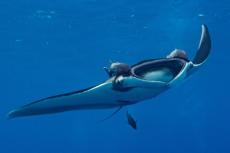Costa Rican aquarium fish industry has negative effect on fish population
Research shows that the collection of Costa Rica's Cortez rainbow wrasse (Thalassoma lucasanum) of Costa Rica has reduced the population in some places.
Costa Rica hosts an active industry for collection activities on marine ornamental reef fish for the international aquarium fish trade. Little is known about the effects of collection activities on target species in Costa Rica. However, research elsewhere gives reason for concern about collecting activity rainbow wrasse (Thalassoma lucasanum) is an important species in this fishery.
Costa Rican collectors prize the vibrantly coloured terminal phase T. lucasanum individuals and but also collect the less colourful younger fish. The researchers measured the density of T. lucasanum and the length of older fish with their final colouration pattern and sex, on highly collected reefs close to a fishing village and on nearby less-collected reefs located within the Guanacaste Conservation Area.
The findings show that densities of T. lucasanum were significantly lower and that older / more colourful individual were substantially smaller on the reefs near the fishing village where collection pressure was high. These findings indicate that even moderate amounts of relatively non-destructive aquarium fish extraction can negatively affect targeted populations.
- Log in to post comments






























